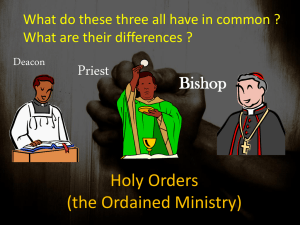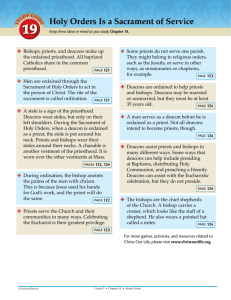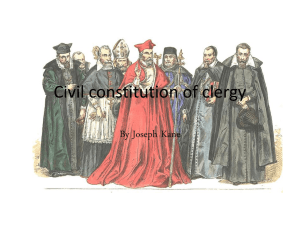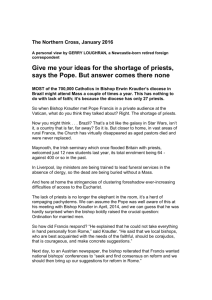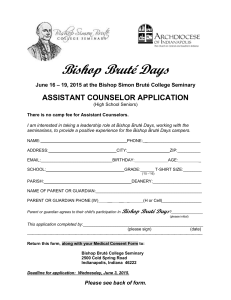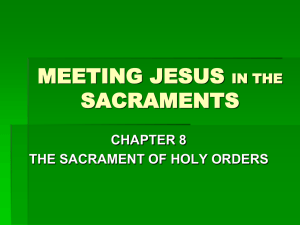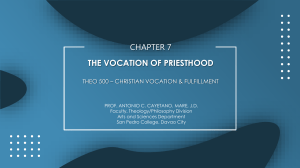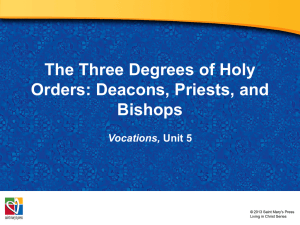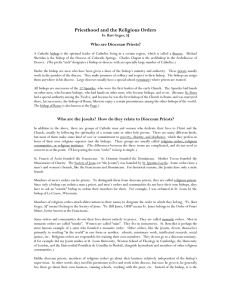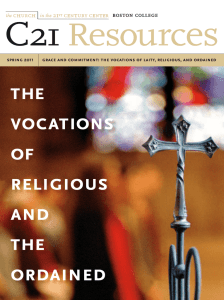Holy Orders - Haiku Learning
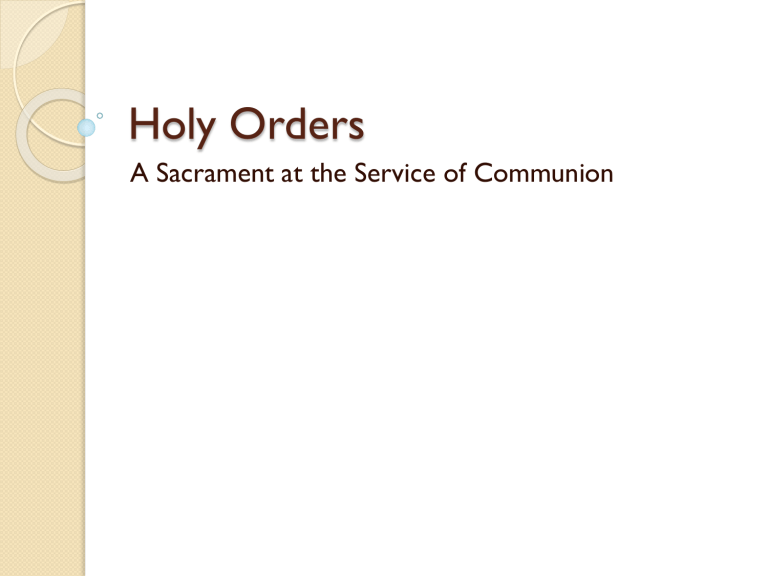
Holy Orders
A Sacrament at the Service of Communion
A Sacrament of Service
A Sacrament instituted by Christ to pass on the ministries of deacon, priest, and bishop in His Church.
The laity exercise a common priesthood through Baptism
The sacramental (ministerial) priesthood is a means by which Christ unceasingly builds up and leads his Church
The three levels of Ordination
There are three levels with different powers, responsibilities, and authority
◦ Episcopacy (Bishops)
◦ Presbyterate (Priests)
◦ Diaconate (Deacons)
Priesthood in Scripture
Aaron, Moses’ brother, helped liberate the
Israelites and became the first high priest
“Golden Calf Incident” Levites become priests
Melchizedek, a high priest who foreshadows Jesus’ priesthood
New Testament: instituted at Last Supper with words “Do this in memory of me”
Bishops
Comes from Greek “episkopos”-overseer
Appointed by the Pope as successors of the Apostles
Sanctify, teach, and govern the Church
Comprise the Magisterium (the Teaching
Authority of the Church
Celebrate ALL Sacraments; they are the only ones who may celebrate Holy
Orders
Bishops
They govern a diocese
Symbols of a Bishop:
◦ Mitre: head covering
◦ Ring: spiritual marriage to the Church, a symbol of bishop’s office
◦ Chair: “cathedra”/ Cathedral church houses chair of Bishop
◦ Crosier: shepherd’s staff symbolizes shepherd of flock
Priests
Preach the Gospel, lead worship, guide the faithful, and celebrate Sacraments
Celebrates Mass, perform other ministries
Diocesan priests: work in a Diocese and serve the Bishop
Priests belonging to religious orders obey their superiors and are united to their communities
Priests
Symbols of a Priest
◦ Stole: band of cloth worn over shoulders as a sign of office. Demonstrates priestly authority
◦ Chasuble: an outer garment, once for warmth, symbolizes the yoke of Christ; changes color depending on season
◦ Chalice/Paten: symbols of priesthood and celebrating Mass
Deacons
Assist bishops and priests
Reads the Gospel and petitions, helps with distribution of Communion
Can celebrate Baptisms and Matrimony
Permanent or Transitional
Symbols
◦ Dalmatic: sleeved garment
◦ Stole: worn over left shoulder
◦ Book of the Gospels
Celebrating Holy Orders
Who?
◦ Baptized male of mature age and excellent character
◦ Someone who has received a “call”
Interior AND exterior
◦ Educated in Theology, understands the responsibilities, and committed to celibacy
Matter, Form, and Minister
Matter: laying on of hands by bishop
Form: consecratory prayer requesting the outpouring of the Spirit on the person
Minister: a validly ordained BISHOP!
The Rite of Holy Orders
Presence of the laity is welcomed
A solemn ceremony held at the Cathedral
Laying on of Hands + Consecration prayer
Eastern Rite distinctions:
◦ Maintain a permanent diaconate
◦ Priests and deacons may both be married
(before their ordinations)
◦ Bishops remain celibate
Effects of Holy Orders
Consecrates a baptized man to the service of God and the faithful
Ordo refers to people of the same profession
◦ Ordo episcoporum
◦ Ordo presbyterorum
◦ Ordo diaconorum
Orders Hierarchy within Church
Titles in Holy Orders
Monsignor: term of honor bestowed on some priests; sometimes used to address bishops
Archbishop: head of an archdiocese/ Eastern
Rites refer to this as an archeparch
Cardinal: an archbishop, bishop, or priest, who has been appointed as one of the Pope’s advisors
Reverend: used for all clergy; formal titles used for Deacons-Bishops.
Effects (continued)
Configures recipient to Christ, so he may serve the Church as an instrument of
Christ
Confers the office of B, P, or D
Leaves an indellible character upon the soul
Grants a particular grace for the exercise of one’s ministry
Important Notes
Just because a priest or bishop acts in
persona Christi does not mean he will be free from sin and error.
The “unworthiness” of the individual does not prevent the sacraments’ graces (ex
opere operato)
Celibacy
By remaining celibate, a priest dedicates his mind, heart, and time to service
Complete self-giving and sacrifice modeled by Jesus
A few exceptions: converts from other
Christian churches with special permission (indult), Eastern Rite
Male Priesthood
Jesus called men to be his Apostles
Not disrespectful toward women, because women are included in ministry in a variety of other ways.
